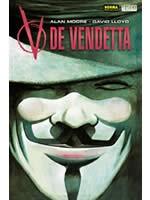 Reviews of some books I've read recently:
Reviews of some books I've read recently:V for Vendetta by Alan Moore and David Lloyd
I can see why a friend urged me to read this Orwellian graphic novel by the celebrated Alan Moore. Not only is it being made into a film, but the story involves the persecution of gays (and other scapegoat minorities) in a new fascist society in the near future. Written in the early 80s, the story is set in the late 90s. V, the hero, is an anarchist Guy Fawkes figure (a terrorist!--from the fascist point of view), fighting to return the possibility of freedom to society. It really couldn't be much more relevant than it is today, with all our talk of giving up civil liberties in exchange for security from terrorism. One of the most sophisticated graphic novels I've read. I wasn't really emotionally involved in the story, but I'll say this for it, at least: I thought it was more effective than Thomas Disch's Camp Concentration, one of its influences. And I'd be impressed to see a teen reading something like this. (Speaking of influences, an essay at the back of the book includes a fascinating list: "Orwell. Huxley. Thomas Disch. Judge Dredd. Harlan Ellison's 'Repent Harlequin! Said the Ticktockman.' 'Catman' and 'Prowler in the City at the Edge of the World' by the same author. Vincent Price's Dr. Phibes and Theatre of Blood. David Bowie. The Shadow. Nightraven. Batman. Farenheit 451. The writings of the New Worlds school of science fiction. Max Ernst's painting 'Europe After the Rains.' Thomas Pynchon. The atmosphere of British Second World War films. The Prisoner. Robin Hood. Dick Turpin...")
Freakonomics by Steven Levitt and Stphen J. Dubner
A zippy but ultimately slight little book filled with interesting tidbits. It's padded (especially the unnecessary introduction) and revoltingly self-congratulatory (the two authors take turns praising each other), but it handles some extremely provacative material with great sensitivity and a refreshing sense of humor. The best sections deal with cheating, the KKK, crack pushers, a debatable crime-abortion link, and parenting, and these sections are worth skimming. I was especially fascinated by the section on Stetson Kennedy and the Klan. They tell a story about how he infiltrated the Klan, learned their secret passwords, and then reported them to the writers of the Superman radio show, which included them in a storyline. When kids across the nation started incorporating the passwords and behavior into their play, it made fools of the members, a big factor that led to their organization's decline. I also learned that the infamous film Birth of a Nation was not just racist, but actually helped spark a huge revival of the organization. Shameful. Despite such interesting sections, ultimately, however, the book lacks depth, as in its brief discussions of homelessness, the origins of Listerine, recent controversy over WMDs in Iraq, and rape statistics, all of which tease the reader without offering anything of substance. As another example of the book's silly, strained and self-congratulatory approach, the writers often lecture on the importance of thinking outside the box. "If you ask the right questions," they write, like, "What do Schoolteachers have in common with Sumo Wrestlers?," you'll achieve fresh new insights. Of course, Levitt never asked himself that ridiculous question. It's obviously a crude rhetorical attempt on the writer's part to connect a hodgepodge of material. Dubner should have assumed a more traditionally modest role in this effort, in which he's more than amanuensis but hardly a co-author. I wanted to gag when they kept excerpting Dubner's original adoring N.Y. Times profile of Levitt as a preface to every chapter. (More padding! More mutual admiration!) A thought-provoking but extremely overrated runaway bestseller, I hope this book is not rewarded with awards.
Empire Falls by Richard Russo
I had two close friends urge me to read this book, telling me it was great, plus it won Russo a Pulitzer prize, so perhaps it was recommended a little too highly. It's certainly very good, and for such a long novel it's quite zippy. The novel feels relevant and deeply lived in, with top notch characterization (although Russo, like many men, has a bit of a problem with women). On the other hand, I couldn't help feeling that the novel betrays a bit of condescension (surely unintended) towards its small town characters. I found its folksiness too cutesy at times. Although tragic things happen, it's the kind of story where balance somehow gets restored in the end. No one's dreams come true, and in some cases good characters move backwards, but they survive. I can appreciate the motivation to make artwork of the ordinary, to play a fanfare for the common man, and I'll admit that I was knocked out by the final chapter of Part One, one of the greatest shorts I've ever read. Russo's prose is always interesting, expertly striking a tone that's neither weighty nor trivial. There were two writers I kept thinking of while reading him, Dickens and Anne Tyler, both of whom, I think, reach greater heights at their best.
The League of Extraordinary Gentlemen V.2 by Alan Moore and Kevin O'Neill
The further (but not final, as I first thought) adventures of the Victorian league of superheroes. Good fluffy fun, as this time around they battle the aliens from Wells's War of the Worlds (now that's timely, isn't it?). I read it as a simple comic book, but some amazing fan's online annotations show how deep the allusions go, panel by panel. They really helped with the opening sequence set on Mars but including some human characters, the significance of which originally eluded me. That's really what the game is here, not so much the storytelling as the allusions to Victorian era storytelling, so be warned.
Song: "Harlem Shuffle" by Bob & Earl - iTunes
Labels: Book Review


0 Comments:
Post a Comment
<< Home